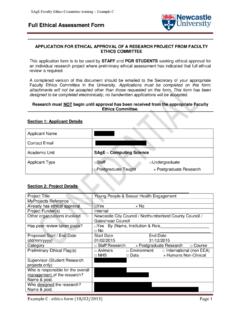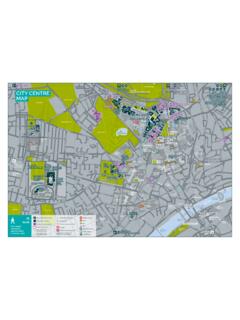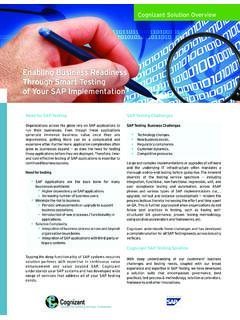Transcription of SUCCESS FACTOR QUESTIONS STANDARD LEVEL …
1 SUCCESS FACTOR interview QUESTIONS STANDARD LEVEL 1 SUCCESS FACTOR QUESTIONS STANDARD LEVEL THINKING STRATEGICALLY 1. Describe the key aims of the department you currently work in, and how your individual job contributes to the achievement of those aims. 2. How do you deal with problems that arise at work? Give an example. 3. What do you think are the most important aspects of your work? Why? 4. How do you determine the relative importance of the different tasks that you have to do in your work? +ve indicators Understands how own job contributes to the aims of the organisation. Anticipates problems by planning ahead. Uses analytical techniques to resolve with problems -ve indicators Takes a short term approach does not anticipate Shows little grasp of the bigger organisational picture. EMBRACING CHANGE 1. What has changed recently in your current job? How did you feel about it?
2 Why? 2. What have you done recently in your current job that is new or different? Whose ideas were they and what prompted them? 3. Tell us about a recent example where you have come up with ideas for doing things differently, what did you do? What did others think about your ideas/changes? 4. Describe any changes or improvements that you have made in your current job, How did you go about it? What was the result? 5. In your job/ life how do you demonstrate a passion for making a difference? Give an example of how you have made a difference (job/life) 6. If you had absolute power what would you change about your current job? Why? What difference would it make to your customers? +ve indicators Comes forward with new ideas and concepts. Develops and implements new ideas. Anticipates change and runs with it. Is able to achieve change at a personal/job LEVEL Accepts that change is important and required as part of improving and achieving Is supportive of others during change Willing to experiment -ve indicators SUCCESS FACTOR interview QUESTIONS STANDARD LEVEL 2 7.
3 Give an example of how you have helped to implement changes or new ways of working in your workplace. What difficulties did you face? How did you help to encourage others to adopt the changes? 8. Describe a situation that demonstrates how you are willing to be flexible and to experiment. Always sticks to tried and tested ways of working Feels threatened by change or new and different things Focuses on what is wrong rather than how to improve things Risk averse Displays reluctance to get to grips with new technologies and techniques SUCCESS FACTOR interview QUESTIONS STANDARD LEVEL 3 GATHERING INFORMATION 1. Give an example of when you have spotted an error at work. What would the consequences have been if you had not spotted it? 2. Give an example of when you have gathered, sorted and presented information at work +ve indicators Demonstrates awareness of the external environment Able to sift data to identify that which is significant, and to present effectively -ve indicators Fails to look critically for information Shows little awareness of, or interest in, the impact that the work of others may have.
4 Does not question Shows little interest in detail. COMMUNICATING Describe a recent situation when you needed to use different communication styles to get +ve indicators SUCCESS FACTOR interview QUESTIONS STANDARD LEVEL 4 your message across and influence people. How would you define good communication skills? Give an example of how you have demonstrated good communication skills and how they helped you achieve the results you needed. Describe a presentation you have given. What were you proud of/what would you do differently? Describe a recent situation where you had to deal with a difficult or tricky situation that required careful communication. How did you handle this? What do you understand by the term two way communication process ? How do you ensure that you demonstrate this in your own communication with others. How do you ensure that people your work with/or your customers know what is expected of them?
5 Clear and concise; gets the message across to others. Chooses communication tools appropriately selective use of emails and other channels of communication. Can hold the attention of others and uses appropriate techniques such as questioning, changing tone and pace, animated style Tailors content to audience Factually correct Understands how best to appeal to the other person/group and correctly interprets the right way to approach a situation Puts forward own view whilst listening and respecting the views and opinions of others -ve indicators o Lacks clarity, confuses messages o Says different things to different people o Only uses one method of communication o Long winded o Does not listen o Mumbles is not clear o Difficult to understand SUCCESS FACTOR interview QUESTIONS STANDARD LEVEL 5 INFLUENCING 1. What do you do if a work colleague is doing something that makes it more difficult for you to achieve your objective?
6 Provide an example 2. Why should we offer this job to you? 3. What impact do you have on your work colleagues? What do they think of you ? Why? +ve indicators Presents a reasoned argument to the colleague, explaining how a change can help. Presents a persuasive argument Demonstrates a realistic awareness of impact on others -ve indicators Does not make direct approach Does not provide reasons Unable to make a reasoned argument or to present it in a persuasive manner Shows little awareness of impact on others PROJECTING CONFIDENCE 1. Describe a recent problem at work. How did you respond to it? 2. Describe a recent problem with a customer. How did you resolve it? 3. What are the current challenges in your present job? Do they offer any opportunities for you? +ve indicators Demonstrates interest Prepared to use intitaive Remained calm, but confident in own ability to resolve issue Shows belief in own abilities -ve indicators SUCCESS FACTOR interview QUESTIONS STANDARD LEVEL 6 Uninterested Lacking confidence to take advantage of opportunities or to resolve issues DEVELOPING TALENT 1.
7 Do you have an appraisal process in your current job? What do you get out of it? 2. What have you learnt over the last 12 months? How did that learning take place? 3. Do you have responsibility for the learning of any of your colleagues? How do you ensure you meet that responsibility? 4. How do you rate your own abilities and performance? On what evidence? How may it be improved? 5. What are your ambitions? How do you plan to achieve them? 6. How do you acquire a new skill or knowledge? +ve indicators Values appraisal puts in time & effort Positive attitude towards learning, accepts personal responsibility for own development Accepts some responsibility for learning/development of others Reflects on own performance and acknowledges contribution of learning to performance Keen to learn more -ve indicators Displays little interest in appraisal or learning Takes no personal responsibility for learning relies on training courses Lacks ambition to learn TEAM WORKING How do you describe effective team work?
8 +ve indicators SUCCESS FACTOR interview QUESTIONS STANDARD LEVEL 7 What is the most successful team you have been a member of? What made it successful? What part did you play? Who do you involve in your decision making process? Describe an example of how involving others helped you to make a difficult decision. Describe a time when you had to work on a project with people outside of your immediate work group. How were you successful in gaining their co-operation? Provide an example of how you gain the co-operation of others? What do you consider to be the advantages of working in a team? - use a real team situation that you have been involved in to answer this question . Use a recent example to describe your team working style and relationship with others. Describe a situation where you have lead a team on a project. How did you ensure co-operation and common understanding across the team?
9 Outline the things you have done in your current role to improve the team environment/atmosphere. Shares relevant and useful information with others Willing to help others and share workloads. Supportive of team decisions Asks others opinions Respects the value that different views bring to the team Gets involved with team tasks Respects the expertise and contribution of others even if own opinion is different Shares praise with the team and passes on credit Operates in a number of different teams Understands that differences in teams are strengths Understands team roles and can adopt a range of team roles -ve indicators o Dismissive of views and opinions of others o Opts out of team activities o Dominating o Shuns opportunities to get involved with networks o Dismissive of views and opinions of others UNDERSTANDING OTHERS 1. Have you had to deal with a customer/student/colleague who was upset?
10 What +ve indicators SUCCESS FACTOR interview QUESTIONS STANDARD LEVEL 8 did you do? 2. Does your manager always give you clear instructions? What do you do if not? Used open QUESTIONS to find out the true problem Interprets body language and other signals at interview Clarifies understanding to avoid misunderstanding Able to show empathy -ve indicators Jumps to conclusions Does not listen Lacks sensitivity to body language etc Does not acknowledge value of others perspective PLANNING AND ORGANISING 1. Describe a typical day at work. How do you decide what order to do your jobs in? 2. Do you sometimes have to change your work plans at short notice to accommodate an unexpected request from your manager? Describe an example +ve indicators Describes a planned and organised approach Can accommodate change without panic Does not react negatively to changes at short notice Attempts to anticipate -ve indicators Does not plan disorganized Resents changes Does not anticipate FINDING SOLUTIONS 1.















